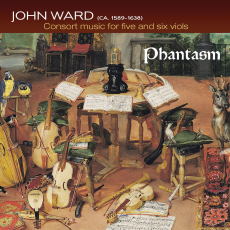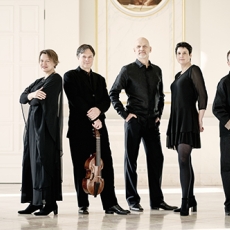Phantasm - Ward: Consort music for five and six viols - International Record Review
It's all very well for the distinctly names Laurence Dreyfus to throw metaphorical stones at John Ward for possessing ‘a name of such unadorned plainness', but there are many benefits to having a moniker which doesn't have to be painstakingly spelt out every time it's presented to the general public. Nevertheless, John Ward's name has none of the multi-syllabic catchiness of his near contemporaries and compatriots Orlando Gibbons or Thomas Morley, nor the alliterate resonance of, say, Thomas Tallis of John Jenkins. Dreyfus may well have a point when he implies that the very ordinariness of his name could have some bearing on Ward's unmemorable-ness as a composer.
Known today primarily as a madrigal composer, Ward spent most of his career in London in the service of Sir Henry Fanshawe, and his music for consorts of five and six viols, all of which is included on this single disc, became very well known in his lifetime, appearing in numerous seventeenth-century sources. He was spoken of highly throughout the century; Dreyfus quotes in his booklet note from a Thomas Mace, who, in 1676 (almost 40 years after Ward's death), described him as possessing ‘great eminence and worth' and whose music made ‘fit monuments and patterns for sober and wise posterity, worthy to be imitated and practiced'. He, himself, was aware that his music was somewhat out of the ordinary and commented that it had ‘bred many censors'. Somehow, over the intervening centuries, Ward has slipped under the radar and, as these exquisite performances from Phantasm, a group founded by Dreyfus himself in 1994, reveal, it is certainly not because his music lacks either quality or a distinctive character.
Rather than re-creating the sound-world of a Jacobean consort of viols, Phantasm have taken as their inspiration the latter-day string quartet and come p with a closely textured and smoothly blended sound in which there is a powerful feeling of interaction between the four players. This is ideal in purveying the most distinctive character of Ward's writing, his passion for dissonance and for roving harmonies - to quote Dreyfus, an ‘obsessive love of interrupted cadences'. My personal favourite among these 23 works, all but three uninspiringly entitled Fantasia, is the ninth for five viols, in which harmonic surprises and startling key relationships makes one wonder whether Stravinsky might not have had a go at preparing it for inclusion in Pulcinella before surreptitiously returning his altered version of the original manuscript to the archive shelf. Yet none is without real charm and distinction, and while Dreyfus suggests that on first hearing some may be inclined to regard this music as ‘no more than scenic and a bit aimless', he does his musicians a disservice (Phantasm are joined by guest viol players Emilia Benjamin and Mikko Perkola). Everything they set their strings and bows to some out as wholly absorbing and, as often as not, absolutely riveting.
Phantasm's perceptive and compelling playing, Linn's demonstration-quality recording, Dreyfus's own highly entertaining (if tinged with a little too much purple prose) and informative notes and a beautifully presented booklet, all conspire to make this disc a sheer delight and not a little revelation. It should remind us always to look behind even the most unprepossessing of names.

